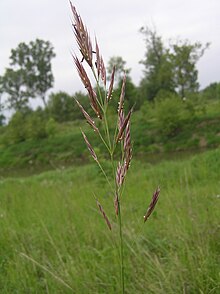Bromus erectus, commonly known as erect brome,[2] upright brome or meadow brome,[1] is a dense, course, tufted perennial grass. It can grow to 120 centimetres (47 in). Like many brome grasses the plant is hairy.[3] The specific epithet erectus is Latin, meaning "erect". The diploid number of the grass is 56.
| Bromus erectus | |
|---|---|

| |
| Scientific classification | |
| Kingdom: | Plantae |
| Clade: | Tracheophytes |
| Clade: | Angiosperms |
| Clade: | Monocots |
| Clade: | Commelinids |
| Order: | Poales |
| Family: | Poaceae |
| Subfamily: | Pooideae |
| Genus: | Bromus |
| Species: | B. erectus
|
| Binomial name | |
| Bromus erectus | |
| Synonyms | |
|
Bromopsis erecta (Huds.) Fourr. | |
Description
editBromus erectus is a perennial, tufted grass with basal tufts of cespitose leaves that is nonrhizomatous. The culms grow between 0.6–1.2 m (2 ft 0 in – 3 ft 11 in) in height. The internodes are typically glabrous. The flattened cauline leaves have pubescent or glabrous sheaths. The leaf blades are 10–20 cm (3.9–7.9 in) long and 2–6 mm (0.079–0.236 in) wide. The grass lacks auricles and the ligule is blunt but finely serrated, sometimes with hairy edges. The contracted and ellipsoid panicle is usually upright, rather than nodding, measuring 7–15 cm (2.8–5.9 in) long. The lanceolate spikelets are 1.5–3 cm (0.59–1.18 in) long and have five to twelve flowers. The glumes are acute, with the lower glumes one-nerved and 7–9 mm (0.28–0.35 in) long, and the upper glumes three-nerved and 9–11 mm (0.35–0.43 in) long. The glabrous or slightly scabrous lemmas are prominently nerved and 10–15 mm (0.39–0.59 in) long, with awns 5–6 mm (0.20–0.24 in) long. The anthers are 4–6 mm (0.16–0.24 in) long. B. erectus flowers in June and July.[4][5]
Range
editFound on well-drained calcerous soils in disturbed areas, fields, and roadsides, B. erectus is widespread in Europe, South West Asia, North West Africa, and has been introduced into North America.[3]
References
edit- ^ a b Bromus erectus was first described and published in Flora Anglica 39. 1762. "Name - Bromus erectus Huds". Tropicos. Saint Louis, Missouri: Missouri Botanical Garden. Retrieved May 22, 2011.
Locality: Habitat in cretaceis circa Rochester, Dartford et Gravesend, in Cantino; Distribution: England
- ^ USDA, NRCS (n.d.). "Bromus erectus". The PLANTS Database (plants.usda.gov). Greensboro, North Carolina: National Plant Data Team. Retrieved 20 June 2016.
- ^ a b C. E. Hubbard (1978). "Upright brome, Bromus erectus Huds.". Grasses. Penguin Books. pp. 72–73. ISBN 978-0-14-013227-4.
- ^ Merrit Lyndon Fernald (1970). R. C. Rollins (ed.). Gray's Manual of Botany (Eighth (Centennial) - Illustrated ed.). D. Van Nostrand Company. p. 101. ISBN 0-442-22250-5.
- ^ Flora of North America Editorial Committee (1993). Flora of North America: North of Mexico. Vol. 24. Oxford University Press. p. 218. ISBN 9780195310719.
External links
edit- Media related to Bromus erectus at Wikimedia Commons